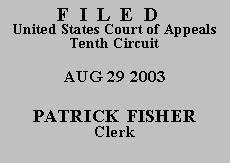

| ANTHONY W. BROWN,
v.
KEVIN MCCRAY, Attorney;
JENNIFER RICHARDS, Attorney;
JOHN WHETSEL, Sheriff; COUNTY
OF OKLAHOMA |
|
In his complaints, Mr. Brown alleges that he spent over 1,500 days in pre-trial confinement before he was afforded a trial, and that he was thereby deprived of due process. He also claims that his pre-trial detention violated his right to a speedy trial and effective assistance of counsel under the Sixth Amendment, R. Doc. 2 at 2, and that the defendants violated his constitutional rights by conspiring to keep him in pre-trial confinement. R. Doc. 11.
On appeal Mr. Brown renews his claims that the named defendants are liable under § 1983 due to the allegedly "excessive" period of pre-trial detention. Aplt. Br. at 14. He further argues that the district court erred in dismissing his complaint because he proved that he was in pre-trial detention for approximately 4 ½ years, and that such amounted to proof that the defendants violated his constitutional rights. Id. at 15. We disagree.
Contrary to the assertions in his brief, it is not enough to state a claim under § 1983 to allege, or even prove, that he was incarcerated as a pre-trial detainee for a certain period of time. As to his request to be released from prison, the magistrate judge properly concluded that such relief must be sought via a petition for a writ of habeas corpus after exhausting any available state-court remedies. See Preiser v. Rodriguez, 411 U.S. 475, 500 (1973).(1) Moreover, we agree that Mr. Brown's damages claims were properly dismissed under 28 U.S.C. § 1915(e)(2)(B)(ii). Because a criminal defendant's attorneys do not act "under color of state law" for purposes of § 1983, dismissal of the claims against his attorneys was proper on that ground. See Polk County v. Dodson, 454 U.S. 312, 317 n.4 (1981) (holding that public defenders do not act under color of state law "when performing the traditional functions of counsel to a criminal defendant."). Moreover, Mr. Brown's conspiracy claim did not save his claims against his attorneys because, although a public defender who conspires with public officials to deprive a client of constitutional rights indeed acts under color of state law, Mr. Brown's conspiracy allegations were conclusory in nature and thus insufficient to state a claim for relief. See Hunt v. Bennett, 17 F.3d 1263, 1268 (10th Cir. 1994) (dismissing § 1983 claim against attorneys on ground that the conspiracy allegation was conclusory and unsupported by facts).
We also hold that Mr. Brown failed to state a claim against the sheriff because he failed to make the required showing that the sheriff personally participated in the alleged constitutional violations. See Olson v. Stotts, 9 F.3d 1475, 1477 (10th Cir. 1993). Although Mr. Brown claims in his brief that the sheriff "knew that he should have been gotten [sic] to trial sooner," Aplt. Br. at 15, the claim is insufficient.(2) Likewise, Mr. Brown failed to allege that the violation of his rights was caused by an official custom or policy of the Countya showing that is required in order to state a § 1983 claim against a municipality. See Bd. of County Comm'rs of Bryan County v. Brown, 520 U.S. 397, 403 (1997).
Consequently, we AFFIRM for substantially the same reasons given by the magistrate judge, and GRANT Mr. Brown's motion to proceed in forma pauperis.
Entered for the Court
Paul J. Kelly, Jr.
Circuit Judge
*. This order and judgment is not binding precedent, except under the doctrines of law of the case, res judicata, and collateral estoppel. This court generally disfavors the citation of orders and judgments; nevertheless, an order and judgment may be cited under the terms and conditions of 10th Cir. R. 36.3.
2. After examining the briefs and the appellate record, this three-judge panel has determined unanimously that oral argument would not be of material assistance in the determination of this appeal. See Fed. R. App. P. 34(a); 10th Cir. R. 34.1(G). The case is therefore ordered submitted without oral argument.
1. Although we must liberally construe pro se pleadings, see Haines v. Kerner, 404 U.S. 519, 520 (1972), we decline to construe Mr. Brown's complaint as a petition for a writ of habeas corpus because such a petition would nonetheless be subject to dismissal for failure to exhaust available state remedies in light of his admission that he has filed no previous lawsuits raising his claims in any state court. R. Doc. 2 at 4.
2. As noted by the district court, a claim against a sheriff in his official capacity is "the equivalent of a suit against [the] County." Lopez v. LeMaster, 172 F.3d 756, 762 (10th Cir. 1999). Consequently, to the extent Mr. Brown's complaint can be construed as including an official capacity claim against the sheriff, we need only address the claim against the County.